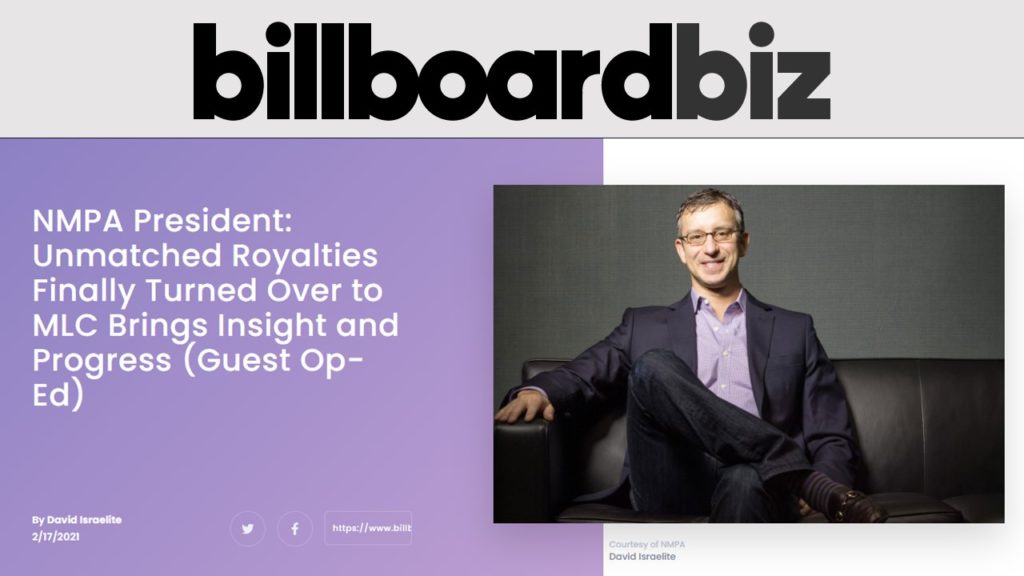Media
NMPA President: Unmatched Royalties Finally Turned Over to MLC Brings Insight and Progress | Billboard Biz

Songwriters and music publishers have for years fought to ensure they were paid accurately and fully by digital streaming services. Unmatched money – or that which streaming platforms have kept because they claim they couldn’t find who to pay – has plagued the music industry not only because money wasn’t being paid out, but also because the services wouldn’t divulge the scope of how much they were holding on to.
Now, thanks to the Music Modernization Act (MMA), we finally know that once elusive amount and it can make its way to its rightful owners. Yesterday, the Mechanical Licensing Collective (MLC), an administrative nonprofit created by the MMA and overseen by publishers and self-published songwriters, announced that just under $425 million in unmatched money was turned over – not including money previously paid out in multiple million dollar settlements. This breakthrough proves how broken the system was, how much the MMA was needed and how much songwriters have to benefit from the protections it put in place. This is a massive win for music creators and also reveals a great deal about the streaming services themselves, most notably, how much they needed the MMA as well.
How we got here is complicated. Separate from the effort to improve how much songwriters are paid from streaming is the challenge of even receiving the money at all. It’s been well known that streaming services were stockpiling unpaid royalties, and over the years that money continued to accrue with little recourse other than costly lawsuits that didn’t solve the underlying problem and threatened the growth we needed in a post Napster world. For over a decade experts have estimated, debated and debunked theories about how much was being held.
Spotify, Apple, Amazon and others have long said they employed exhaustive searches for copyright owners. There have been congressional oversight hearings, studies done by the U.S. Copyright Office and industry experts, however the magnitude of the problem remained unknown. The services were careful never to divulge how much they had stored, and after many years of attempting to procure that number through lawsuits, it took legislation to compel.
Signed into law in 2018, the MMA created a system where streaming companies could receive a blanket license to play all music in exchange for proper payments which included handing over historically unmatched money and usage data, ensuring tech companies no longer held onto that money, and payouts finally were accurate, creating an environment for streaming to grow and songwriters no longer be shortchanged. The MLC is tasked with not only finding the owners of unmatched money but in doing so help fill information gaps, including creating an unprecedented, transparent database of unmatched songs and the ability for copyright owners of any size to claim ownership and money owed.
The MMA has forced the progress and transparency we see today, but it wasn’t always clear we would be able to find such a win-win solution. Instead of brokering the compromise with digital services in the bill, some advocated suing these services into oblivion. We would have won those lawsuits. However, doing so would have destroyed the very platforms predominantly paying creators. Therefore the MMA was negotiated to create a system where copyright owners could contend with unmatched money themselves, remedying the past and helping shore up the streaming economy for the future.
To do this, the industry had to start up an unprecedented solution. The creation of the MLC was a massive task that began when the U.S. Copyright Office launched an open process for anyone to submit a plan to organize and manage the Collective. The industry-consensus submission, spearheaded by NMPA, NSAI and SONA, was designated and last year the MLC was founded. Since then it has established a headquarters in Nashville, hired approximately 50 staff, and it began offering blanket licenses to digital mechanical streaming services last month. It is also building a portal for claiming unmatched money and has developed a customer service team to guide songwriters through its processes. Much of this work has been in anticipation of finally learning the full amount of unmatched money it must administer – a milestone finally reached.
That number turns out to be on the high end of reported estimates, while still falling short of the rampant rumors spread by third parties with something to gain by inflated falsehoods. The actual number exposes several realities, most notably that streaming services should have been doing a much better job at finding copyright owners, and now we know why they were so reluctant to say just how much they were keeping. Specifically, of the $424,384,787 turned over from 20 digital service providers, we now know that the most unmatched was held by the largest steaming companies such as Apple, Spotify, and Amazon.
While it’s disappointing that it took legislation and creating a new company to reveal this information, the good news is that receiving what they’re owed won’t cost copyright owners a penny. All the work that will go into researching the "nine billion lines of data" of historically unmatched money now housed within the MLC, will be paid for by the digital services who by law must fund the MLC. There will be no administrative fees taken from songwriters and music publishers to do this work. Additionally, the MMA ensures that songwriters receive at least 50% of all unmatched money, however ultimately we know that the industry practice is to give songwriters much more than that percentage.
While the MLC will do mountains of matching on its own, it is also up to every copyright owner to delve into the portal once it’s launched and claim what is theirs. The good news is there is time. The MLC is working on making this information public and it rightfully decided to extend the matching period to liquidate the money from the law’s minimum of 18 months to three full years, giving copyright owners even longer to act.
Inevitably some will focus on the fact that so much money was not paid out to music creators, and that frustration is warranted. However, finally we know just how much we didn’t know, and therefore the process officially can begin to pay out the missing money that is needed now more than ever.
NMPA has always worked to understand the universe of historically unmatched songs, and we are excited to support the efforts to not only match that money but also fix the systemic problems that have contributed to streaming services failing to find music owners.
When we began negotiating the MMA years ago, one end goal was finally to obtain the stores of money and data that the streaming companies were sitting on, and today we confidently can say we have more information than ever before. With this knowledge, we can create a more robust streaming market, not marred with millions in unknown, unmatched money being kept from music creators.
David Israelite is the president & CEO of the National Music Publishers' Association (NMPA). The NMPA is the trade association representing American music publishers and their songwriting partners.
